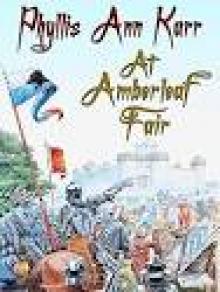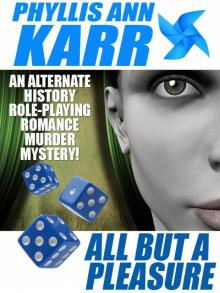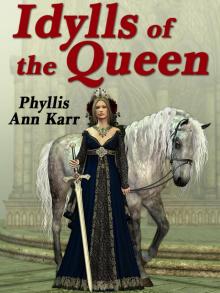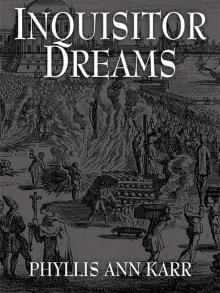- Home
- Phyllis Ann Karr
The Fanciers & Realizers MEGAPACK Page 13
The Fanciers & Realizers MEGAPACK Read online
Page 13
Cagey had already dropped off good. Zoe could hear her sleep-breathing through the bedcurtains, and she never made any other sound the whole time the twins were figuring out how to load the blanks into the gun and getting the big old flashlight out of the sleeping loft where they’d been keeping it.
“We oughta leave her a note,” said Ace.
“Right. In the comfort room. She’ll see it there, all right.” Zoe handprinted the note on a sheet of paper:
“Dear Cagey,
We’re out in the woods spotlighting to test your theory. We’ll keep near the railroad tracks.
A. and Z.”
She wrapped it loosely around six teaspoons and balanced the bundle on top of the toilet paper so that it’d fall off as soon as the roll was pulled.
“Y’know,” Ace remarked as they struck out, “this could be dangerous.”
“Hey, that’s how the screenshow pollies always get their crook, isn’t it? Besides, we’re only out to demonstrate a negative. M. Shima doesn’t have any reason to want us dead, and neither does Sheriff Detweiller.”
“Unless they suspect that we suspect. Or feel they need to prove that somebody’s after everybody who comes out spotlighting. Maybe we should’ve checked with Cagey before trying this.”
“Do you really think she’d have let us come out? Relax, brother. All the coffee she drinks, she’ll be up and find our note before we even spot a critter.”
In fact, they began to think they never would spot critters, especially when they had to keep zigzagging back to make sure they were still within twenty or thirty meters of the tracks. Every so often one of them suggested going deeper into the woods; but Zoe had told Cagey they’d keep near the tracks. And besides that, they were afraid of getting lost if they didn’t.
One of them carried the flashlight while the other carried the gun, and once in a while they traded. Ace was carrying the flashlight when at long last its beam caught a pair of bright, staring eyes. “There!” he whispered, thrilled, holding the light steady on the tree. “Raccoon?”
Zoe fired. The shot thundered out loud as a real bullet. The light jerked—Ace couldn’t help it—and the coon or whatever escaped in a fluster of leaves and branches.
“Wow!” Zoe said, sounding happy.
“Y’know, we really didn’t have to shoot,” Ace said, struck with a sudden doubt. “I mean, isn’t just being out here at night with a spotlight enough?”
“Nope,” Zoe said positively. “No good without the sound effects.”
“Yeah, but I just thought of something. What if M. Shima slipped us some real bullets?”
Zoe tilted the flashlight so that it cast its glow between their two faces, stared at her brother a moment, and finally shook her head. “Naw. Why would she do that? Besides, Shima’s my suspect, remember? Detweiller’s the one you’re working on.”
They walked farther. Somehow all the rustlings and snaps and owl calls and bat squeaks and other night noises sounded louder now than they had before. A person could almost imagine that the animals were talking about it among themselves, plotting something ... “More hunters! Let’s get ’em ...”
Ace was getting ready to make a remark about it, and Zoe was considering bringing up the idea of wandering back in the direction of the Moonshine Resort, when a hard thud took them both on the back of the head.
It knocked Ace out. Zoe clung to a little stunned consciousness, just enough to be aware of somebody tying them up and dragging them…to the railway tracks. Laying them out with one cold track beneath the backs of their necks ...
She opened her eyes and tried to sit up. Immediately a weight was on her chest and something cold, hard, and sharp was pressing lightly but steadily across her throat. Beside her to the right, Ace moaned.
“Lie still,” said a man’s voice, “and you will die quickly. Struggle, and the knife will rip your bowels first.”
“We’ll ... shout,” Ace said, still groggy.
“Even if your screams are heard, they will not be recognized as anything human. We are too far from any house.”
Far in the upslope distance, the Appalachia Pufferbelly sounded its oldtime train wail.
“Don’t fear that,” said the man. “By the time it reaches you, you will lie frozen in death before its shining light. As Wayne Colfax and Jethro Davis lay here before you. As your animal brothers and sisters stood frozen in your small lights, waiting to die for no better reason than to give you sport.” His knees on their chests, he reached down for their faces, clamping one hand over each of their mouths and using his thumbs and forefingers to pinch their nostrils shut. He did it like an expert ... like he’d had lots of practice ... Zoe tried to kick, thinking that a knife in the abdomen might be preferable ... The Appalachia Pufferbelly wailed again, very slightly closer…he’d still have plenty of time to untie their hands and feet before leaving them ...
“Running Stag!” It was Cagey’s voice.
He took his hands off their faces. Gasping, they opened their eyes again. They couldn’t see their cousin—she must be on the other side of the tracks, and they couldn’t crane their heads around enough to get her in their sightline—but the beam from her flashlight was playing straight on Chief Running Stag. Only he wasn’t wearing his blanket and warbonnet. He was wearing only breeches and warpaint, and his naked upper body gleamed like it was oiled.
He caught his knife up again and held it ready to strike any of them. Like a black belt in Amerind fighting.
Now that they knew she was there, they could hear Cagey’s footsteps advance a couple of paces. “Chief Running Stag,” she went on. “If you remember, this morning you did me the honor of calling me a ‘force of nature.’”
“I remember, and I repeat it. Between my people and you there is no quarrel.”
“Okay, then, from one force of nature to another, let ’em go. Let my cousins go.”
“They have wastefully attacked nature in a way that is against even your own laws. I regret that they are your cousins, but they no longer deserve to be a part of nature alive. Let their bodies return to her in death.”
“They were using blanks,” said Cagey.
“What?” said Running Stag.
“Yeah, that’s right,” Ace said eagerly, while Zoe held her breath and wished she could kick him so he’d leave the talking to Cagey. “Blanks. We weren’t really hunting at all.”
Running Stag deliberately looked away from him back to Cagey.
“That’s right, Chief,” she said. “They were just helping me try out a theory. That vow you took, whatever it was—it wouldn’t authorize you to execute simple roleplayers who were never really out to harm nature, would it?”
The train wailed again, a little closer yet.
Running Stag stood, picked up Cagey’s gun, and pointed it straight at Ace. The boy started to shut his eyes, remembering his suspicion about M. Shima maybe slipping them live ammo, and Cagey’s warnings about even blanks being dangerous at close range. Then he looked again, remembering how important it was to put on a brave face in front of Native Americans. This wasn’t close range ... was it? Close range for real bullets ... real close…but not close enough for a blank to do any damage? If it was, Cagey would be saying some—
The shot deafened his eardrums. That was all. For a few minutes, he thought it was plenty, and he’d be deaf for life.
Running Stag dropped the gun, caught up his knife, bent, and cut the twins free. The first notice they had that their hearing was coming back was another long, distant hoot from the Appalachia Pufferbelly.
Although it was still a safe distance away, Cagey ran up the trackbed, threw an arm around each of her cousins, and started hustling them down the other side. Her toe caught on the track, they all tumbled, and the twins rolled. Running Stag took time to lift Cagey’s foot off the track.
“You’re under arrest,�
�� she told him calmly.
“Am I?” he replied, equally calm.
“Just one question,” she went on. “Is it some kind of secret nature-preservation society?”
“It is not. It is a shamanistic vow that a few of us take, individual by individual, those who are guided by a Great Dream to act as the instruments of our animal sisters and brothers in exacting fit justice for the wrongs they suffer. It is a punishment to fit the crime, is it not, that who hunts with a small spotlight should die beneath a great one?”
Without another word, the Amerind turned and loped off into the woods.
“Come on, kids,” said Cagey, getting shakily to her feet. “He never said not to report him, so we’ll leave it to Detweiller and his posse to round him up. Meanwhile, help your poor old cousin limp back to bed before she has any more accidents.
“You know,” she added, “you kids made sure I wouldn’t get very much sleep tonight, but what I got was enough. I guessed who our killer was because all the symbolism sort of fell into place in ... well, you might call it a ‘Great Dream’ of my own.”
* * * *
I always enjoyed working with Cagey, and wish I had done so more often. I remember some vague ideas for a novel in which Cagey herself would have fallen victim to murder—the crime probably disguised as one more of her almost nonstop accidents—and her ghost would have come back to help Tommi solve the case. This might explain the occasional note of nostalgia, almost but not quite bittersweet, I seem to sense in Tommi’s accounts. In the Cagey’s Ghost novel itself, I think I would have aimed for the kind of feel one gets, for instance, in “Topper,” or the old Abbott and Costello movie “The Time of Their Lives.” Nor would it necessarily have put a period to Cagey Thursday stories: one could always have dug into her back files (in fact, both Sunvale and Pi Rho may have been written after Cagey’s death); or one might go forward with a ghost detective.
Unfortunately, I have not yet seen any way to get Cagey Warrington Thursday into the re-imagined R.S.A. stories. She is too thoroughly and joyously a fantasy perceiver. She makes one major reappearance in this volume, however, to co-star in The Dracula of Pi Rho—the original version of Clement Czarny’s collegiate adventure.
Ace and Zoe make another appearance in “The Pickets of Hellmouth.” I’m not sure about the chronological order of these two stories in their young lives.
* * * *
THE REALIZERS/FANCIERS WORLD
Even though the next stories jump ahead about a generation in the development of the realizers/fanciers world, The Standard Murder Mystery is where it all started. Here are the first appearances anywhere of Corwin Poe, Angela Garvey, Rosemary Lestrade, and Dave Click (who in the fanciers-free version of the R.S.A. becomes Dave Clayburn).
From a letter dated July 8, 1983, from The Mysterious Literary Agency:
Dear Ms. Karr:
Thank you for the opportunity to read The Standard Murder Case [sic], and I must apologize for the amount of time it has taken to respond. However, our decision was not easily reached—there were several readings of the manuscript—and I wanted to be certain that we gave the book, and the idea of representing you, a fair chance. ... The major stumbling block of all of us was that too much of the story seemed to be concerned with the concept of ‘realizers and fanciers’ and not enough with the mystery elements or the movement of the story....
Sincerely,
[signed] Otto Penzler
From another, dated August 16, 1983, from The Adele Leone Agency, Inc.:
THE STANDARD MURDER MYSTERY…falls between two categories: SF and detective fiction. Double genre novels tend to appeal to neither market rather than both. ... we’d be happy to look at any other projects you wanted to do ...
Best wishes,
[initialed] Adele Leone”
* * * *
To these charges I plead guilty and can only testify that my observation as a reader suggests that crossovers or “double genre” fictions in fact appeal to a certain percentage of readers—perhaps not large, but enthusiastic.
—Phyllis Ann Karr Hoyt
Hoyts’ Hobbitat, June 2013
THE STANDARD MURDER MYSTERY
In the great old tradition of Golden Age Whodunits, I provided a Cast of Characters list for this short novel:
The middle, or “family” names are fixed, women inheriting from their fathers and men from their mothers; but first and final names may be changed at any time for a small reregistration fee. Governors always take their final name from their office, other realizers often gear theirs to their line of work. Fanciers adopt names to fit their personal perceptional worlds. I have divided the following list into “Realizers” and “Fanciers,” but beware: one or two of the supposed fanciers may be closet realizers, and some thinkers have theorized that there is a little bit of the fantasy-perceiver buried in almost every realizer.
REALIZERS
Margaret Walking-Horse Standard. A practical woman in late middle age, she is The Standard: one of the very highest government officials, a sort of human meterstick who wields final judgment on what constitutes objective reality.
Aelfric Saxton Standard. An amiable young man in his twenties, he changed his final name from Legison to Standard when Dame Margaret appointed him her chief assistant and heir to the office.
Pamela Bludso Weaver. By working her way up early to shop supervisor, she came to the attention of Squire Fitzhugh, the factory’s hereditary owner, who made her his newest protegee in hopes of matching her with Aelfric Standard.
Emily Marshal Jones. Once Squire Fitzhugh’s nurse, M. Jones is now the competent and motherly head of his household staff of two.
Claude Harvey Portent. Squire Fitzhugh’s manservant enjoys his job because of the chances it gives him for observing the fancy class at close hand and teasing them a bit when opportunity arises.
Rosemary Lozinski Lestrade. Murder depresses the senior police sergeant. She spends most of her working hours in a state of chronic depression, but someone has to do the job. She chose her final name because it tends to make fanciers perceive her as a bumbling sidekick, which can be useful.
David Chekov Click. Like Lestrade, the junior sergeant affects a pipe as stage prop; unlike her, he fills it with tobacco. Click enjoys fancy-class investigations and looks forward to the day Lestrade entrusts him with concerting the Big Revelation Scene.
FANCIERS
Thurby Fitzhugh Fitzhugh. Everyone likes the “squire,” a generous old boy who lives in a Dickensian world and makes it his pastime to gather houseparties beneath his roof with matchmaking intent.
Irene Mbunga DiMedici. A statuesque woman of African descent, she prefers to see herself as a Renaissance countess, and wears a heavy ring on each finger. The jewels are real. Are the poisons they hide equally real?
Dobbert O’Banion Drake. The “captain’s” fantasy may be the strangest of all: he perceives Fitzhugh Manor as a windjammer standing out to sea.
Willa Grandar Quantum. She lives in a world of space opera, but has learned to keep quiet about her perceptions lest they be laughed to scorn as scientifically untenable.
Stanley Abercrombie Livingstone. An old chum of Squire Fitzhugh’s, the African explorer sees most realizers as natives, friendly or restless.
Nantice Borzoi Serendip. A pretty, petite young woman with Oriental blood, she lives, childlike, in a world that changes from day to day. Most fanciers’ perceptions harden along chosen lines somewhere during adolescence. Hers never hardened.
Tertius Black White. The Countess DiMedici perceives him as the most desirable male beneath Fitzhugh’s roof. Corwin Poe sees him as a Harlequin. No one quite knows what White himself perceives.
Angela Garvey Garvey. This friendly, golden young woman lives in a world of such unfailing good cheer that on discovering the body, she props it up to watch the sunrise, without recognizin
g it for a corpse.
Corwin Davison Poe. Perceiving the police sergeants’ fingerprinting equipment as thumbscrews, Poe decides he is their primary suspect and embarks on his own dangerous game to pinpoint the murderer.
* * * *
“... a distinct universe walks about under your hat and under mine—all things in nature are different to each—the woman we look at has not the same features, the dish we eat from has not the same taste to the one and the other—you and I are but a pair of infinite isolations, with some fellow-islands a little more or less near to us.”
—Thackeray, Pendennis, Vol. I, ch. XIV
Prologue
“The sun expires in a pool of its own dark blood,” said Corwin Poe, holding up his wineglass as if to compare its color with that of the sunset. “Now might one almost believe in the deities of antique times, glimpsing their raven’s wing across the bruis-ed sky. The scene may well attune an oversensitive ear to the anguish of the encoffined living as they turn in their premature graves.”
“Yes, the natives are restless this evening,” Stanley Livingstone agreed. “You can hear their drums already.”
“Oh, nonsense!” said Angela Garvey Garvey. “It’s a beautiful sunset, it’s been a delightful day, and it’s going to be a gorgeous, starry night. Those are frogs you hear drumming in the pond. Froggy courtship rites.” She gave something between a giggle and a chuckle. “Will there be a moon tonight?”
“Full,” said Corwin. “Full and brilliant in its mottled radiance. Werewolves as well as vampires will walk tonight.”
Angela laughed again and held out her glass. M. Jones, the butler, refilled it. Angela winked at M. Jones and after a moment M. Jones winked back.
“If I may put in a word, M.’s,” the servant reminded them, “Fitzhugh Manor’s well insulated. Nothing’s getting in tonight unless we let it, not howling natives, not werewolves and vampires, not even drafts.”
“None but the beasts within our own bosoms.” Corwin drained his glass and frowned at it until M. Jones refilled it. “Rare Amontillado, this, against the coming night.”

 The Gallows in the Greenwood
The Gallows in the Greenwood At Amberleaf Fair
At Amberleaf Fair Frostflower and Thorn
Frostflower and Thorn The Fanciers & Realizers MEGAPACK
The Fanciers & Realizers MEGAPACK All But a Pleasure
All But a Pleasure The Idylls of the Queen
The Idylls of the Queen Frostflower and Windbourne (Frostflower & Thorn)
Frostflower and Windbourne (Frostflower & Thorn) Inquisitor Dreams
Inquisitor Dreams